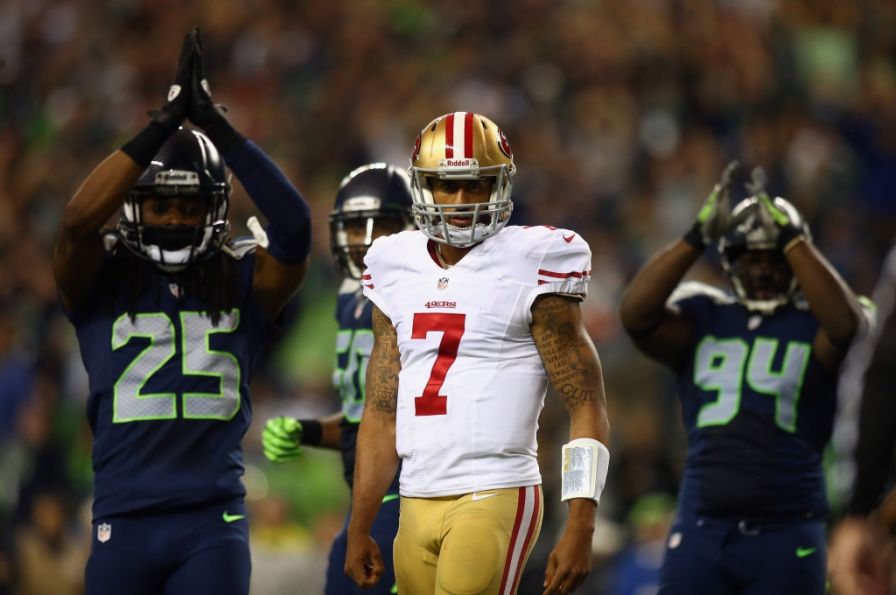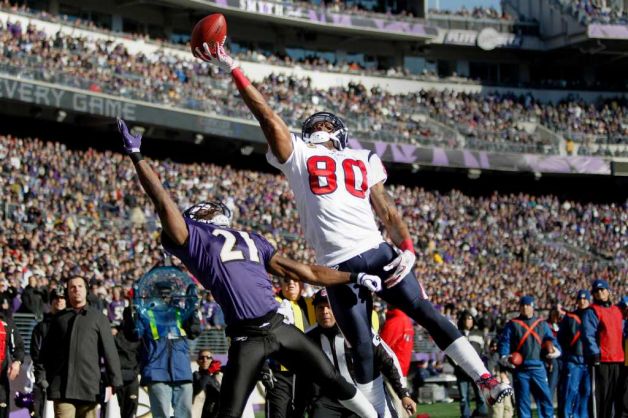Though Joe Flacco’s career could understandably be described as inconsistent, there have been times, even full seasons, when everything seems to click for the Ravens’ quarterback completely.
Throughout Joe’s seven year career as a pro, he’s seen three major transitions at the Offensive Coordinator position, in addition to multiple changes in terms of who calls the plays.
Normally, it would be safe to assume that a quarterback such as Flacco would struggle with such transitions, particularly before his sixth season in the NFL (a la Alex Smith with six OC changes in six years).
But Flacco’s numbers indicate a different trend entirely. It seems that his numbers get more impressive as the schemes and coordinators change. Whether it’s a mid-season adjustment, or learning a new playbook from scratch in the case of Gary Kubiak’s arrival, Joe’s past has shown that he not only rolls with the change well, but more often than not he prefers it.
When Cam Cameron had full control of the offense through Flacco’s first two years as a pro, Joe’s numbers were solid, but not particularly stellar. His rookie season in 2008 brought typical rookie numbers: 14 touchdowns, 12 interceptions, and a completion rate of 60 percent.
With another year in the system, Flacco posted a much better touchdown/interception ratio of 21-12. This year, 2009, was the season Cameron fully implemented his new scheme.
But then came major changes in years that followed.
Let’s first take a look at the addition of Quarterbacks Coach Jim Zorn back in 2010. While Flacco had steadily improved from 2008 to 2009, there were questions as to whether he’d “break out” as a dominant quarterback. While Jim Zorn was only a position coach and not a play caller, it was well documented that Flacco developed a strong rapport with Zorn, and leaned on the coach for his progressions on and off the field.
Flacco’s 2010 season was statistically the best of his career thus far: Throwing a career high 25 touchdowns, a career low 10 interceptions, and posting a passer rating of 93.6, which was good for seventh at season’s end. It was clear that Joe thrived with the sharing of responsibilities among the staff.
It’s somewhat worth noting that Flacco was admittedly angry when the Ravens decided to let Zorn go to ultimately hand Cameron full control again. “I’m not happy about it, and they know I’m not happy about it,” Flacco said. “It’s kind of an attack on me.”
Flacco’s performance slipped the following year with Cameron again alone at the helm offensively, posting a career low 57.6 completion percentage in 2011. Although no media outlets had hard evidence that Flacco and Cam Cameron butted heads, there was an underlying tension within the organization regarding their relationship, and it was clear that Flacco needed “his guy” in some capacity, whether it is a position coach or head play caller.
The very next year, Flacco had his guy, again in the way of a quarterbacks coach. Jim Caldwell, fresh off a head coach stint with the Colts, joined the Ravens’ staff as a Quarterbacks Coach and Offensive Consultant in 2012. The organization’s goal was clearly to get Joe more comfortable in his own offense, all the while buffering the friction between he and Cam Cameron.
Eventually, there was no friction between Flacco and Cameron, because directly after a loss to the Washington Redskins in week 14, Cameron was fired. Caldwell took over the play calling duties, but it was more apparent that Flacco put the team on his back and felt more comfortable at the helm.
Once again, Flacco proved that coaching staff adjustments increase his productivity in general. Statistically, the Ravens’ quarterback was right back where he was in 2010, but reached the highest achievement of all, leading his team to a Super Bowl victory in 2012 while winning the MVP award. Throwing 11 touchdowns to zero interceptions, Flacco’s historical postseason performance was hard to ignore as a direct correlation to Cam Cameron being let go mid-season.
What’s perhaps more relevant is Flacco’s apparent comfort level within his offense when it’s just that–his offense. For whatever reason, the organization hasn’t exactly appeased Flacco’s subtle requests to be more aggressive with his own play-calling and run more no-huddle schemes.
Let’s look into the concept more deeply. If Joe Flacco historically seems to get a jumpstart of sorts with a coach/coordinator switch, whether it’s Cameron, Zorn, or Caldwell, it may very well be Flacco himself that goes into a different mode.
In other words, rather than Joe needing to fit into a particular scheme, which could seem picky and high maintenance, it’s rather the transition period itself where Flacco shines, simply because he needs to. Before the scheme is fully implemented and the coaches have full control, Flacco seizes an opportunity to take full control. Freestyle could describe it just as well.
In fact, Caldwell’s second season in command is a direct example of this theory. In Caldwell’s first season as an interim OC, Flacco was forced to shoulder more of the load due to adjustments on the fly, as the firing of Cameron came so late in the year. Joe then has a career-best run.
The very next year, when Caldwell had a full offseason to implement his scheme, Flacco struggled, as did the entirety of the Ravens’ offense. It’s certainly feasible that Joe having less freedom than he did in the 2012 postseason is a direct reason for the vanilla offense the following year.
The idea of Flacco’s performance improving with more independence and responsibility, as well as less structure and implementation of scheme, could again work to the Ravens’ advantage. With the latest coaching overhaul on offense, Kubiak’s scheme may take a full season to reach full impact.
The larger point here is that the full season it takes to get used to Kubiak’s playbook might actually be the season in which Joe has the most control and freedom. Fans should have some hope in the trend of Flacco playing his best football within that trial season. Change is Joe’s friend, not his weakness.








